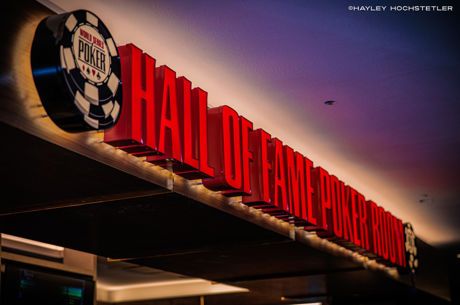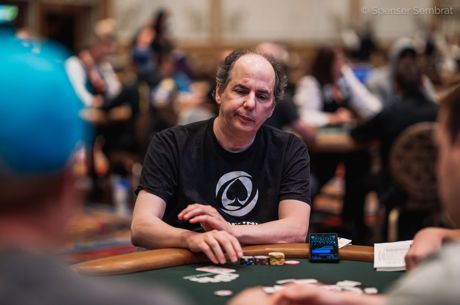PokerNews Op-Ed: How Hard Will It Be to Cash Stolen Bellagio Chips?

On Tuesday, Dec. 14, 2010, a man pulled into the north valet entrance of the Bellagio on the Las Vegas Strip at 3:50 a.m., entered the casino and approached a craps table. The man — who was wearing a white, full-face motorcycle helmet and a leather jacket — produced a handgun and demanded money. After receiving cash and chips valued up to $1.5 million, he jogged out of the casino, got on his motorcycle, and took off west on Flamingo Road. The suspect was described as a white male about 5 feet 10 inches tall and 220 pounds. He is also suspected of robbing the Suncoast on December 8 in a similar manner, but that time he only took $20,000. He has not been caught.
The scene was something straight out of the film Ocean’s Eleven and instantly made national headlines. No one was hurt in the incident, but that didn’t stop the sensationalism. Since the robbery, authorities are searching hard for the mystery assailant and have said that even though he was able to get away with a hefty sum, the suspect will have a tough time cashing in because most of what was stolen was in Bellagio chips ranging from $100 to $25,000 in value. It will be rather difficult for him to cash those chips.
David Schwartz, director of gaming research at the University of Nevada, Las Vegas, said: "I can't think of any way you could [cash them in]. It's not like they're currency that you can use anywhere. If you steal so many chips, in such a big, dramatic way, there's going to be a lot of scrutiny at the casino, and that makes it very difficult to cash in."
Schwartz makes a good point, but there is a flaw in his reasoning. While those chips may not be currency in cities like New York or Miami, they’re often viewed as better than cash in Sin City. That’s right, anyone familiar with the gambling scene in Las Vegas will tell you that casino chips are a form of currency that are often used to pay debts, finalize loans, act as tips, and serve as an easy way to transport money. It’s much easier to carry a single $25,000 chip than the same amount in cash. Many properties honor chips from other casinos, although this practice is usually reserved for high rollers. Whatever the case may be, the stolen chips clearly have value in Vegas.
Even so, authorities believe that industry safeguards will help prevent redemption of the stolen chips and render them valueless. While those safeguards aren’t exactly known (and the Bellagio is not volunteering that information), it is common knowledge that most high-denomination chips like the stolen $25,000 chips are monitored by the casinos and sometimes contain radio-frequency identification technology, which tells the casino where the chip came from when scanned with a casino chip reader. "It would be the equivalent of stealing a gift card," Police Lt. Clint Nichols has said. "It doesn't have any value. It looks good, but they know it's been stolen."
Unlike a gift card, the stolen chips do not have to be activated to have value; it is already there. With that said, it becomes a matter of extracting their value as cash. Therein lies the problem for the robber. I admit this will be difficult to accomplish, but I believe it is doable. I am reminded of an old Vegas story involving supposedly stolen high-denomination chips and a Las Vegas legend by the name of Bob Stupak.
In August 1999, Stupak, the man responsible for building the Stratosphere, attempted to redeem $250,000 worth of $5,000 chocolate chips at Binion’s Horseshoe. Becky Binion-Behnen, then president, insisted that a rack of such chips had been stolen and refused to cash them. Stupak claimed they originated from a hefty blackjack win, although no pit boss could remember Stupak’s win. The situation quickly deteriorated as Stupak “donated” one of the chips to a local antigambling congregation with the idea that refusing to honor the chip would bring negative attention to the Horseshoe. The ploy worked, and after a court battle, Stupak won and the chips were cashed.
Not only is the story highly entertaining, the moral of the story can be applicable to the stolen Bellagio chips. The robber should anonymously donate some of the big chips to various charities, homeless shelters, orphanages, etc. Sure, it will be suspicious when these charities come forward with them, but can they be 100 percent positive that the chips were in fact stolen and not donated by a rich philanthropist? I don’t think so because they received them anonymously. It will be more than likely that they’re the chips in question, but if there is a reasonable doubt, could the Bellagio refuse to cash them?
Imagine an elderly nun who found a $25,000 chip in the collection plate with a note that says: "Please use to help others. I'd feel better knowing part of my income went to help others." She has no idea how it got there, but knows the money could go a long way in helping the needy. She goes to cash it in, only to draw the ire and suspicion of Bellagio officials. The authorities investigate, determine she is innocent of any wrongdoing and determine the chip is most likely stolen, but could have been donated, legally, in good faith. Could the Bellagio refuse to cash the chip? If it did, it would immediately be vilified by the media and face a public relations nightmare. My guess is that the Bellagio would suck up the loss and cash the chip.
Now, this wouldn’t necessarily help the robber redeem chips himself, but continuing to flood the market with the chips would. Give even more chips away, anonymously of course, to random people. Simply drop some chips on the ground, send them in the mail, or be creative. Soon, dozens of people will be walking into the Bellagio trying to cash the chips. There will be a ton of suspicion, but how can anyone keep track of so many people? Even if they’re investigated, they’ll be found innocent, merely possessing a chip that was either found or anonymously donated to them, much like the example of the elderly nun. Once again, with reasonable doubt in play, could the Bellagio refuse?
Now the thief and his associates will be free to simply wander into the Bellagio as one of the lucky, “unsuspecting” people who received a chip and take a chance at cashing them in. Keep in mind, many of the lower-denomination chips like the $100-$5,000 chips will be much easier to cash because many more are in circulation than, say, a $25,000 chip. Perhaps those are the ones to give away. While this certainly isn't a fool-proof plan, I believe it would increase the chance of successfully cashing the stolen chips.
Granted, the robber would have to give up a good portion of his loot to make money, but it would be worth it in the long run. After all, wouldn’t it be better to give up $500,000 worth of chips if it helps cash in the other $1 million without as much scrutiny and suspicion? Better to have some than none. Now, I am sure there are flaws in my argument, but I thought it would be fun to put myself in the robber's shoes and hypothesize a possible solution. This thief was smart enough to orchestrate a simple robbery of a premiere casino, so I think he is smart enough to work out a plan to cash in his loot. I think he’ll have an easier time redeeming those chips than the authorities, media and casino officials would have you believe.
If you want to hypothesize a bit, use the comments section to tell me how you would go about cashing in the chips. In the meantime, be sure to on Twitter and on Facebook.
The views expressed in this article are those of the author and are not necessarily reflective of views of the 7h1.shop








